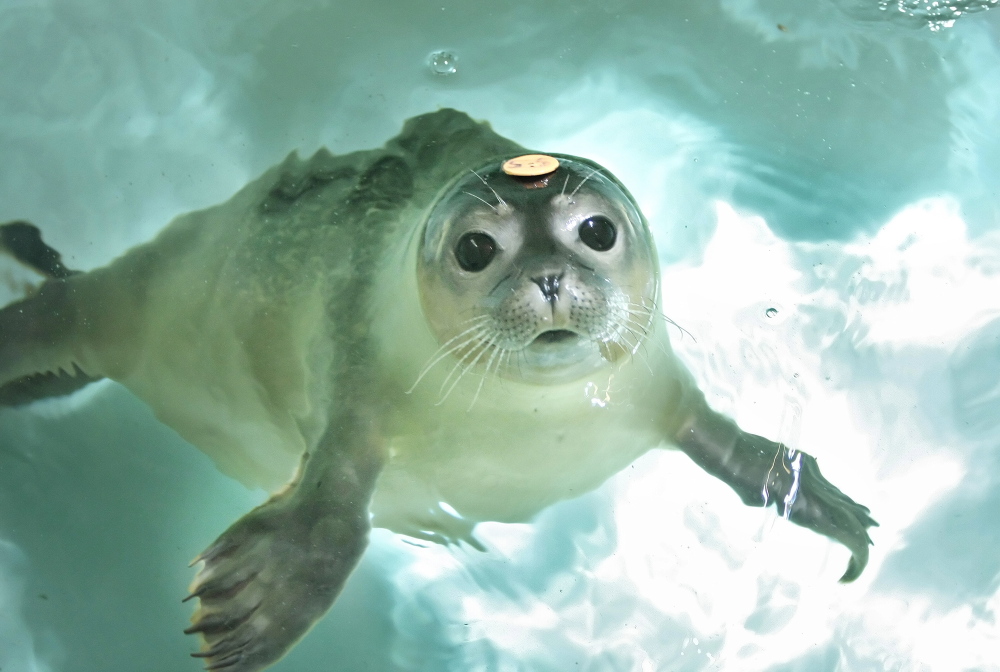The University of New England is closing a rehabilitation center that has helped more than 1,000 injured or stranded marine animals return to the sea since it was founded in 2001.
The college, which has campuses in Portland and Biddeford, said finances and a need to put its resources into degree-granting programs were behind the decision to close the Marine Animal Rehabilitation Center, which primarily rehabilitates rescued seals and sea turtles.
But the head of a program that rescues sea animals said the decision to close the center comes at “the most critical time of the year” because late May and June is when seal pups tend to be abandoned by their mothers, often because of human intervention.
“This is the worst timing for something like this to happen,” said Lynda Doughty, executive director of Marine Mammals of Maine, which has about 60 volunteers who deal with seal abandonment and marine mammal strandings from Kittery to Rockland.
“Memorial Day weekend is usually our busiest weekend,” said Doughty, who added that UNE informed her group of its decision to close the rehab center for the first time Friday morning.
UNE’s facility is the only rehab center for marine animals in Maine and Doughty said Marine Mammals of Maine took most of its rescued animals there. She said Marine Mammals of Maine has an agreement that allows it to take some seals and turtles to the Mystic Aquarium in Connecticut, but she said that facility has limited space and the longer trip provides more opportunities for human interaction with the animals. Any human interaction makes it harder for the animals to readapt to the wild, Doughty said.
Ed Bilsky, UNE’s vice president for research and scholarship, said the college intends to launch a new degree program in ocean studies and marine affairs and can’t justify running the rehab center at a time when it is trying to control tuition increases.
He also said the school will expand its ocean and marine programs with a series of “major grants” that will be announced over the summer. Most of the focus will be on programs that involve sustainable fisheries, marine science and ocean policies, fields in which jobs are more plentiful.
But none of the new funding is for the rehab center, which had received federal grants of up to $100,000 a year under a National Oceanic and Atmospheric Administration grant program. But that grant program isn’t due to receive any funding for the upcoming budget year, he said, and it costs about $3,000 to $4,000 to care for a seal until it can be released.
Bilsky said no classes are built around the rehab center, although many students volunteer to help care for the animals until they are released. The program has also been popular with the public, and many people turn out to watch as rehabilitated animals are released on local beaches.
The center currently has six seals and two or three sea turtles, Bilsky said. It isn’t taking in any new animals, he said, so once they are released in the next few weeks, the center will be closed.
Bilsky said the populations of many species of seals along the Atlantic Coast have rebounded in recent years and some have been removed from the endangered species list.
Doughty said that’s true, but the bigger population also makes it more likely that people will come in contact with marine animals, particularly seal pups, which are often left on the shore while a mother seal swims off to catch fish.
If the mother seal sees a person or dog near the pup, she said, she will often leave the pup, fearing that she could be attacked by people or animals if she goes ashore to retrieve it.
Doughty said the UNE center could often be counted on to take as many as 40 pups that have been abandoned.
She said volunteers were watching eight pups Friday night and if they remain abandoned Saturday, they will be taken down to Mystic. But she isn’t sure how many more the Connecticut facility can care for and said that Marine Mammals of Maine also takes care of sea animals that are rescued by the College of the Atlantic in Bar Harbor.
If the numbers of stranded marine animals jump, she said, Marine Mammals of Maine will allow more time to pass before intervening. Pups that have been abandoned for a long time sometimes have to be euthanized because they will die without their mother if humans can’t rescue them and take them to a rehab center.
Edward D. Murphy can be contacted at 791-6465 or at:
emurphy@pressherald.com
Send questions/comments to the editors.




Success. Please wait for the page to reload. If the page does not reload within 5 seconds, please refresh the page.
Enter your email and password to access comments.
Hi, to comment on stories you must . This profile is in addition to your subscription and website login.
Already have a commenting profile? .
Invalid username/password.
Please check your email to confirm and complete your registration.
Only subscribers are eligible to post comments. Please subscribe or login first for digital access. Here’s why.
Use the form below to reset your password. When you've submitted your account email, we will send an email with a reset code.